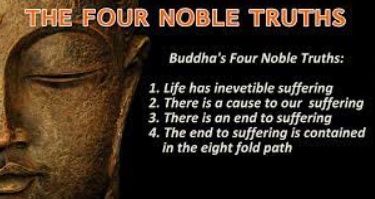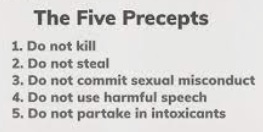Buddhism

Buddhahood is the state of an awakened being, who, having found the path of cessation of dukkha[3] ("suffering", as created by attachment to desires and distorted perception and thinking) is in the state of "No-more-Learning". Buddhists do not consider Gautama to have been the only Buddha.
All Buddhist traditions hold that a Buddha is fully awakened and has completely purified his mind of the three poisons of craving, aversion and ignorance. A Buddha is no longer bound by saṃsāra, and has ended the suffering which unawakened people experience in life.
Thích Nhất Hạnh, a Vietnamese Buddhist monk in the Zen tradition, states that "Buddha was not a god. He was a human being like you and me, and he suffered just as we do." (Wikipedia)
The Buddha taught that while we each have accumulated karma from previous lives as well as from the present one, karma is mutable. Every moment is an opportunity to take positive action, to think, speak, and act in a skillful way that will lead us away from the clinging and delusion that keeps us mired in suffering. In other words, we can work with our karma to ensure a better future.
The Buddha’s best-known teachings, the four noble truths and the eightfold path, describe the nature of human suffering and a way to liberate oneself from the existential pains of life and reach nirvana. Various traditions share a conviction that one can come to understand the truth of existence by living an ethical life dedicated to spiritual development.
Buddhism is more a way of knowing and cleaning the lens of perception than a theistic religion concerned with metaphysical “God” questions. In telling us mostly how to see, Buddhism both appeals to us and challenges us because it demands much more vulnerability and immediate commitment to a practice.(Rohr)
Four Noble Truths

The first truth is that life inevitably contains dukkha—suffering, pain, and dissatisfaction. Indeed, life itself—the very fact of being born, getting old, and dying—is suffering, never mind all the limitless other types of stress and suffering experienced in a lifetime.
The second noble truth is that suffering has a cause, and the cause is manufactured by our own minds. It is the mind’s craving and ego-fixation that keep us bound to the endless cycle of birth and death, and thereby endless suffering. Because we are ignorant of the cause of our suffering, we constantly look to the wrong sources for happiness, none of which are enduring or reliable.
The third noble truth is that there is a way out. By apprehending the true cause of dukkha and the means to its end, we can free ourselves and achieve enlightenment. The way out is based not on belief, however, but on our own embodied experience of how we cause ourselves to suffer and of the true nature of reality.
The fourth noble truth is the path of practice that leads to awakening. This is known as the noble eightfold path, a path of living ethically, training the mind, and cultivating wisdom. When factors of the path are developed and enacted simultaneously, they can open the door to enlightenment.
Father Richard has often said that transformation mostly comes through great love and great suffering. The First Noble Truth of Buddhism shows how accepting the inescapable nature of suffering can lead to greater freedom. If we can accept where we are, and not judge the disruption in our life as wrong or bad, we can touch great freedom. This is because fighting what is doesn’t actually work. As the saying goes, “whatever we resist persists.” See that along with all the suffering and pain, there are also many beings that are supporting others in the present moment. I saw that suffering doesn’t have to disappear in order for beauty to be there.(Rohr)
Thich Nhath Hanh often said, “A true practitioner isn’t someone who doesn’t suffer, but someone who knows how to handle their suffering.”
Five Precepts

1. refrain from taking life (even an insect’s)
2. refrain from stealing or taking what is not freely given
3. refrain from illicit sexual conduct (this includes sex with people who are already married or in relationships as well as with minors, and any other kind of sex that causes harm to oneself or others)
4. to refrain from unskillful speech, including telling lies, gossiping, and speaking harshly
5. to abstain from taking intoxicants that cause heedlessness.